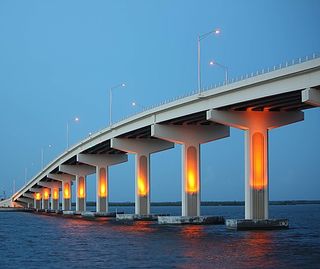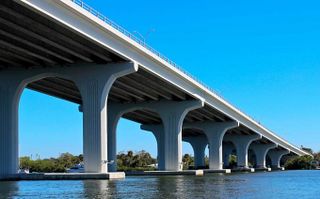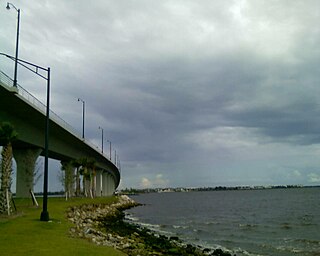Indian River Bridges: Difference between revisions
mNo edit summary |
mNo edit summary |
||
| Line 1: | Line 1: | ||
<div class="irlbody"><!-- Body Content Div --> | |||
<div class="irlheader"><!-- Header Div --> | |||
{{IRL header bridge}} | {{IRL header bridge}} | ||
= | <p class="irlsubtitle">Bridges and Causeways that cross the Indian River.</p> | ||
</div><!-- End Header Div --> | |||
<div class="irlcontenttop"><!-- Content Top div --> | |||
<div class="irlcontentleft"><!-- Content Top LEFT div --> | |||
<div class="irlabout"><!-- About div --> | |||
==About== | |||
Until 1920, there were only two bridges spanning across the Indian River, one in Brevard County's Cocoa and the second in Martin County's Hobe Sound. On Labor Day in 1920, a new wooden Vero Bridge opened and access to the ocean was available to all who lived on the Vero mainland. For boat traffic, a bridge tender, who lived in a house near the middle of the crossing, would open the metal swing span by hand. Tolls were charged to cross the bridge, ranging from 5 cents for pedestrians, 10 cents for horses and 35 cents for delivery trucks.<ref name=tcpalm /> | Until 1920, there were only two bridges spanning across the Indian River, one in Brevard County's Cocoa and the second in Martin County's Hobe Sound. On Labor Day in 1920, a new wooden Vero Bridge opened and access to the ocean was available to all who lived on the Vero mainland. For boat traffic, a bridge tender, who lived in a house near the middle of the crossing, would open the metal swing span by hand. Tolls were charged to cross the bridge, ranging from 5 cents for pedestrians, 10 cents for horses and 35 cents for delivery trucks.<ref name=tcpalm /> | ||
In 1925, construction began on the first wooden bridge across the Indian River Lagoon in Eau Gallie. On February 22, 1926, the bridge opened to vehicle traffic headed to a sand trail at Canova Beach. There was no railing on the bridge for a year after its construction. There are no records that anyone fell off the bridge during this time.<ref name=wiki /> | In 1925, construction began on the first wooden bridge across the Indian River Lagoon in Eau Gallie. On February 22, 1926, the bridge opened to vehicle traffic headed to a sand trail at Canova Beach. There was no railing on the bridge for a year after its construction. There are no records that anyone fell off the bridge during this time.<ref name=wiki /> | ||
Post War 1940's the U.S. government funded construction of new bridges across the Indian River. As Florida's population grew, more traffic headed to the barrier islands, and modern bridges created from steel and concrete were constructed. These early concrete and steel bridges used earthen berths to partially span the river, with a lift or swing drawbridge in the middle to allow tall boats to pass. A boat unable to pass under the bridge would signal the tender, who was in a shack hanging off the bridge's side, to open the drawbridge so they could pass through. In less populated areas, the drawbridges were unattended at night and boats would have to anchor, and await the bridge tender's return the next morning. | Post War 1940's the U.S. government funded construction of new bridges across the Indian River. As Florida's population grew, more traffic headed to the barrier islands, and modern bridges created from steel and concrete were constructed. These early concrete and steel bridges used earthen berths to partially span the river, with a lift or swing drawbridge in the middle to allow tall boats to pass. A boat unable to pass under the bridge would signal the tender, who was in a shack hanging off the bridge's side, to open the drawbridge so they could pass through. In less populated areas, the drawbridges were unattended at night and boats would have to anchor, and await the bridge tender's return the next morning. | ||
A lagoon does not have a typical river type current, their water is only moved by wind and a minor tidal flow. Earthen berm causeways contribute to the Indian River's health problems by impeding the lagoon's water flow, limiting it's ability to flush out stagnant water containing algae, bacteria, dead seagrass and pollutants. Recently the river's communities have recognized the harm these old berm bridges cause, and are requiring high rise bridges that span the entire river. | A lagoon does not have a typical river type current, their water is only moved by wind and a minor tidal flow. Earthen berm causeways contribute to the Indian River's health problems by impeding the lagoon's water flow, limiting it's ability to flush out stagnant water containing algae, bacteria, dead seagrass and pollutants. Recently the river's communities have recognized the harm these old berm bridges cause, and are requiring high rise bridges that span the entire river. | ||
<div | </div><!-- End About div --> | ||
{{ | <div class="irlbow"><!-- Water Body div --> | ||
==Indian River Bridges by County== | |||
{{IRL_bridges indian river}} | |||
</div><!-- End Water Body div --> | |||
</div> <!-- END Content Top LEFT div --> | |||
<div class="irlcontentright"><!-- Content Top RIGHT div --> | |||
<div class="irlcontentrightimage"> | |||
[[File:Wabasso_Bridge_Old.jpg|320px|frameless|right|Old Wabasso Bridge, Vero, Indian River County]] | |||
</div> | </div> | ||
<div | <div class="irlcontentrightimage"> | ||
[[File:Haulover Canal Bridge, FL, US.jpg|320px|frameless|right|Haulover Canal Bridge, Merritt Island]] | |||
</div> | |||
<div class="irlcontentrightimage"> | |||
[[File:Max_Brewer_Bridge_001.jpg|320px|frameless|right|Max Brewer Bridge, Titusville, Brevard]] | |||
</div> | |||
</div><!-- END Content Top RIGHT div --> | |||
</div><!-- End Content Top div --> | |||
<div class="irlcontentmiddle"><!-- Content Middle div --> | |||
<div class="irlcontentmid1"><!-- Content Mid 1 div --> | |||
==Bridge Info Cards== | ==Bridge Info Cards== | ||
===Brevard County=== | ===Brevard County=== | ||
| Line 232: | Line 253: | ||
|} | |} | ||
<section end=ernestlyonsbridge /> | <section end=ernestlyonsbridge /> | ||
===Bridge Inspections | </div><!-- END Content Mid 1 div --> | ||
<div class="irlcontentmid2"><!-- Content Mid 2 Div --> | |||
==Bridge Inspections== | |||
* [http://bridgereports.com/fl/volusia/ Volusia County Bridge Inspection Reports] | * [http://bridgereports.com/fl/volusia/ Volusia County Bridge Inspection Reports] | ||
* [http://bridgereports.com/fl/brevard/ Brevard County Bridge Inspection Reports] | * [http://bridgereports.com/fl/brevard/ Brevard County Bridge Inspection Reports] | ||
| Line 239: | Line 262: | ||
* [http://bridgereports.com/fl/martin/ Martin County Bridge Inspection Reports] | * [http://bridgereports.com/fl/martin/ Martin County Bridge Inspection Reports] | ||
* [http://bridgereports.com/fl/palm-beach/ Palm Beach County Bridge Inspection Reports] | * [http://bridgereports.com/fl/palm-beach/ Palm Beach County Bridge Inspection Reports] | ||
</div><!-- End Content Mid 2 div --> | |||
<div | </div><!-- End Content Middle div --> | ||
<div class="irlcontentbottom"><!-- Content Bottom Div --> | |||
<div class="irlcontentweblinks"><!-- Web Links Div --> | |||
==Web Links== | |||
* [https://www.epa.gov/sites/production/files/2018-01/documents/58692_an_river_lagoon_an_introduction_to_a_natural_treasure_2007.pdf EPA - An Introduction to a National Treasure] | |||
</div><!-- End Web Links Div --> | |||
<div class="irlcontentref"><!-- References div --> | |||
==References== | ==References== | ||
<references> | <references> | ||
<ref name=tcpalm>[https://www.tcpalm.com/story/news/local/indian-river-county/2019/04/18/3-bridges-spanning-indian-river-mainland-orchid-island-have-quite-stories-tell/3495957002/ Vero Beach Centennial: Barber, Alma Lee Loy, Wabasso bridges built as county population grew]</ref> | <ref name=tcpalm>[https://www.tcpalm.com/story/news/local/indian-river-county/2019/04/18/3-bridges-spanning-indian-river-mainland-orchid-island-have-quite-stories-tell/3495957002/ Vero Beach Centennial: Barber, Alma Lee Loy, Wabasso bridges built as county population grew]</ref> | ||
<ref name=wiki>[https://en.wikipedia.org/wiki/Eau_Gallie_Causeway Eau Gallie Causeway]</ref> | <ref name=wiki>[https://en.wikipedia.org/wiki/Eau_Gallie_Causeway Eau Gallie Causeway]</ref> | ||
</references> | </references> | ||
</ | <references /> | ||
</div> <!-- | </div><!-- END References div --> | ||
{{IRL footer bridge}} | </div><!-- END Content Bottom Div --> | ||
<div class="irlfooter">{{IRL footer bridge}}</div><!-- Footer div --> | |||
</div><!-- END Body Content div --> | |||
[[Category:Indian River]] | [[Category:Indian River]] | ||
[[Category:Bridges]] | [[Category:Bridges]] | ||
<!-- | <!-- Add this, then save, then edit again, to insert blank template | ||
{{IRL_table bridge} | {{subst:Template:IRL_table bridge}} | ||
--> | --> | ||
Revision as of 19:59, October 31, 2019
Bridges and Causeways that cross the Indian River.
About
Until 1920, there were only two bridges spanning across the Indian River, one in Brevard County's Cocoa and the second in Martin County's Hobe Sound. On Labor Day in 1920, a new wooden Vero Bridge opened and access to the ocean was available to all who lived on the Vero mainland. For boat traffic, a bridge tender, who lived in a house near the middle of the crossing, would open the metal swing span by hand. Tolls were charged to cross the bridge, ranging from 5 cents for pedestrians, 10 cents for horses and 35 cents for delivery trucks.[1]
In 1925, construction began on the first wooden bridge across the Indian River Lagoon in Eau Gallie. On February 22, 1926, the bridge opened to vehicle traffic headed to a sand trail at Canova Beach. There was no railing on the bridge for a year after its construction. There are no records that anyone fell off the bridge during this time.[2]
Post War 1940's the U.S. government funded construction of new bridges across the Indian River. As Florida's population grew, more traffic headed to the barrier islands, and modern bridges created from steel and concrete were constructed. These early concrete and steel bridges used earthen berths to partially span the river, with a lift or swing drawbridge in the middle to allow tall boats to pass. A boat unable to pass under the bridge would signal the tender, who was in a shack hanging off the bridge's side, to open the drawbridge so they could pass through. In less populated areas, the drawbridges were unattended at night and boats would have to anchor, and await the bridge tender's return the next morning.
A lagoon does not have a typical river type current, their water is only moved by wind and a minor tidal flow. Earthen berm causeways contribute to the Indian River's health problems by impeding the lagoon's water flow, limiting it's ability to flush out stagnant water containing algae, bacteria, dead seagrass and pollutants. Recently the river's communities have recognized the harm these old berm bridges cause, and are requiring high rise bridges that span the entire river.
Indian River Bridges by County
Bridge Info Cards
Brevard County
Haulover Canal Bridge
| Indian River Bridges | |||||
|---|---|---|---|---|---|
| Haulover Canal Bridge | Road: SR3 | FDOT: 703004 | |||
| Water: Haulover Canal | City: Merritt Island | County: Brevard | |||
| Type: Double Leaf Bascule Span | Length: | Height | Built: 1964 | ||
| 1964 U.S. Army Corps of Engineers' Bascule double leaf drawbridge crossing Florida SR3 (N Courtney Parkway) over the Haulover Canal in the Merritt Island Wildlife Refuge.[3] | |||||
Max Brewer Bridge
| Indian River Bridges | |||||
|---|---|---|---|---|---|
| Max Brewer Bridge | Road: SR406 | FDOT: 700227 | |||
| Water: Indian River | City: Titusville | County: Brevard | |||
| Type: Segmental Span | Length: 3,207' | Height: 65' | Built: 2010 | ||
| Completed in 2010, the 3,207' long, 65' high A. Max Brewer Bridge connects the City of Titusville to Merritt Island providing access to the Kennedy Space Center via SR406. Includes a fishing pier and boat ramps on the west side and a 20' observation deck at the crest. This bridge is a good observation site for Kennedy Space Center, when it is closed to vehicle traffic. Read More | |||||
Sebastian Inlet Bridge
| Indian River Bridges | |||||
|---|---|---|---|---|---|
| Name: Sebastian Inlet Bridge | Road: A1A | FDOT: 880005 | |||
| Water: Sebastian Inlet | City: Indian River Oaks | County: Brevard | |||
| Type: Concrete Cast-in-Place | Length: 1548' | Height: 37' | Built: 1964 | ||
| Built by Cleary Brothers Construction Company, West Palm Beach, Florida, and was completed in 1964. A fishing pier is constructed below the bridge and goes out the inlet along the jetty to the Atlantic. | |||||
Indian River County
Wabasso Bridge
| Indian River Bridges | |||||
|---|---|---|---|---|---|
| Wabasso Bridge | Road: CR510 | FDOT: 880053 | |||
| Water: Indian River | City: Wabasso | County: Indian River | |||
| Type: Stringer | Length: 112.9' | Height: 62' | Built: 1970 | ||
| The Wabasso Bridge is a two-lane concrete bridge spanning SR510 over the Indian River (Intracoastal Waterway) in Indian River County, Florida. Read More | |||||
| * BridgeReports: National Bridge Inventory data | |||||
17th Street Bridge
| Indian River Bridges | |||||
|---|---|---|---|---|---|
| 17th Street Bridge | Road: CR656 | FDOT: 880077 | |||
| Water: Indian River | City: Vero Beach | County: Indian River | |||
| Type: Stringer/Multi-beam | Length: 4730.9' | Height: 62.3 | Built: 1979 | ||
| 17th Street Bridge (officially named the Alma Lee Loy Bridge in 2012[1]) is a fixed concrete bridge that spans the Indian River intracoastal waterway in Indian River County, Florida. The bridge, started in 1977, was constructed by Gulf Contracting Inc, FL and was completed in 1979. | |||||
| * Bridge Report | |||||
Merrill Barber Bridge
| Indian River Bridges | |||||
|---|---|---|---|---|---|
| Merrill P. Barber Bridge | Road: SR60 | FDOT: 880087 | |||
| Water: Indian River | City: Vero Beach | County: Indian River | |||
| Type: Stringer/Multi-beam | Length: 3834.2' | Height: 62.3 | Built: 1995 | ||
| The Merrill Barber Bridge is a concrete arch bridge that spans the Indian River Intracoastal Waterway in Indian River County, Florida. Read More | |||||
Martin County
Roosevelt Bridge
| Indian River Bridges | |||||
|---|---|---|---|---|---|
| Roosevelt Bridge | Road: US1 | FDOT: 890160 | |||
| Water: St. Lucie River | City: Stuart | County: Martin | |||
| Type: Segmental Span | Length: 2982.8' | Height: 62.3' | Built: | ||
| The Roosevelt Bridge is a major highway segmental bridge across the St. Lucie River in Stuart, Florida. Carrying U.S. Route 1, it was built to supersede the old Roosevelt Bridge, which had twin parallel drawbridges, one for northbound traffic and the other for southbound. | |||||
| * Bridge Report | |||||
Ernest Lyons Bridge
| Indian River Bridges | |||||
|---|---|---|---|---|---|
| Ernest Lyons Bridge | Road: A1A | FDOT: 890158 | |||
| Water: St. Lucie River | City: Sewell's Point | County: Martin | |||
| T'ype: Segmental Span | Length: 4600' | Height: 62.3' | Built: 2008 | ||
| The new Ernest F. Lyons Bridge is a 4600-ft-long, 31-span, two-lane, precast segmental bridge built using the span-by-span method of construction. | |||||









